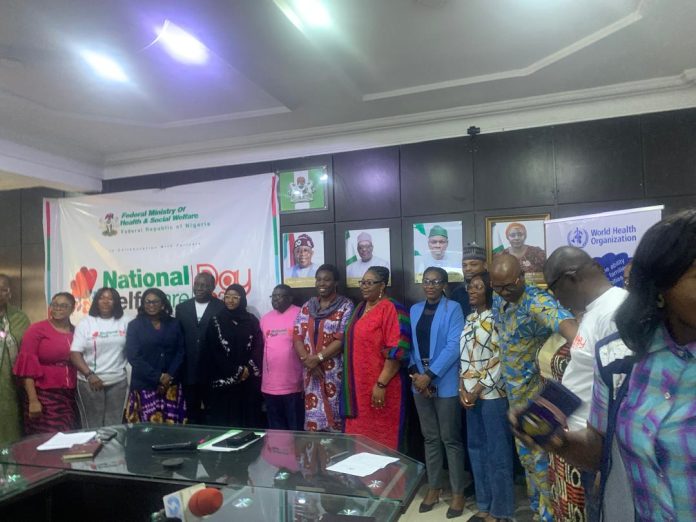By Emmanuella Oghenetega
The Federal Government has commemorated Nigeria’s maiden National Self-Care Day, calling on citizens to take greater responsibility for their own health and wellbeing through daily personal health practices.
During a Ministerial press briefing in Abuja, the Coordinating Minister of the Federal Ministry of Health and Social Welfare, Professor Muhammad Ali Pate, emphazied that self-care is not a luxury but a necessity in Nigeria’s push for Universal Health Coverage (UHC).
At the event themed “Self-care: Empowering Individuals, Families and Communities for Universal Health Coverage” and the slogan “Prevent, Protect, Empower,” the Coordinating Minister emphasized that promoting self-care will not only ease the burden on the health system but also empower Nigerians to take control of their physical, mental, and emotional wellbeing.
Represented by Pharmacist Olubunmi Aribeana Director Food & Drugs Services Department Federal Ministry of Health Social Welfare; Prof. Muhammad Ali Pate further explained that “Self-care is more than taking medication or eating healthy; it is the intentional choices we make every day to protect, preserve, and promote our physical, mental, emotional, and social health.”
“To institutionalize this approach, the government unveiled two key policy documents: the National Guidelines on Self-care for Sexual, Reproductive and Maternal Health and the Demand Generation Strategy for promoting self-care practices, particularly in underserved areas.”
“Observed globally on July 24, International Self-Care Day is marked as a reminder that caring for one’s health should be a continuous practice, 24 hours a day, 7 days a week. Nigeria’s adoption of this day reflects a growing recognition that proactive, community-based health practices are essential to national wellbeing,” coordinating minister speech highlighted.
Professor Pate stressed that transforming Nigeria’s health outcomes cannot rely solely on clinics and hospitals, but must involve empowering citizens to make daily healthy choices.
“The power to transform health outcomes rests not only in our clinics and hospitals but in our homes, our schools, our communities, and in each of us,” he stated.
In her welcome remarks, Dr. Binyerem Ukaire, Director Family Health Department in the Ministry, reinforced the importance of prevention, protection, and empowerment as pillars of Nigeria’s evolving health agenda.
“Healthcare is not just about treatment; it is about prevention, safeguarding lives, and giving people the tools to make informed choices,” she said.
The Federal Government called on civil society, the private sector, and development partners to support efforts in building a self-care culture across all demographics.
“We cannot do this alone,” Dr. Ukaire emphasized. “Partnership is essential to building a healthier, more self-aware Nigeria.”
In his goodwill messages, Dr. Muyi Aina, Executive Director/CEO of the National Primary Health Care Development Agency (NPHCDA) who was represented by Aisha Ibrahim Jalingo said;“We are pleased and honoured to participate in this special Memory Booth celebration in commemoration of National Self-Care Day. This day highlights the transformative power of self-care in promoting universal health coverage and achieving our collective development goals.
“By prioritizing self-care, individuals are empowered to take charge of their health, prevent illness, and enhance their overall well-being. Self-care is not only a personal responsibility, it is a strategic pillar for strengthening our health systems and building resilient communities.
Dr. Alex Garasira, Acting WHO Country Representative, who emphasized the growing relevance of self-care in the face of healthcare workforce shortages and limited access to essential services in Nigeria and across the African region.
“With millions in the African region, including Nigeria, lacking access to essential health services and a global shortage of healthcare workers, self-care interventions have the potential to significantly transform how people manage their health and well-being,” Dr. Garasira said.
WHO reiterated its commitment to supporting Nigeria in integrating self-care into routine health services.
“Our progress will be accelerated through collective efforts. Working together, we can build a safer, healthier world for all of us,” Dr. Garasira affirmed.


